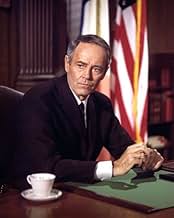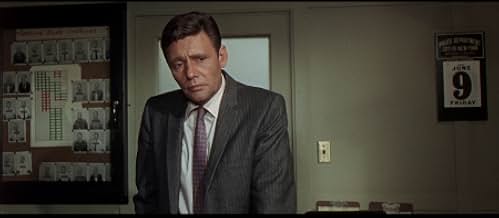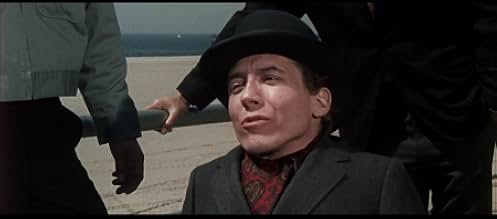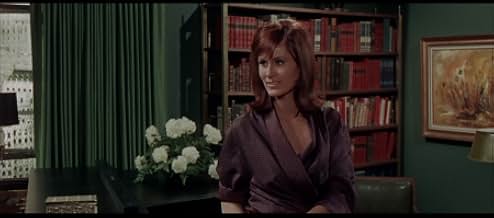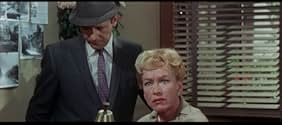PUNTUACIÓN EN IMDb
6,5/10
4,3 mil
TU PUNTUACIÓN
En el Harlem español de la ciudad de Nueva York, los detectives Madigan y Bonaro reciben 72 horas de su superior para capturar a un matón buscado por homicidio en Brooklyn.En el Harlem español de la ciudad de Nueva York, los detectives Madigan y Bonaro reciben 72 horas de su superior para capturar a un matón buscado por homicidio en Brooklyn.En el Harlem español de la ciudad de Nueva York, los detectives Madigan y Bonaro reciben 72 horas de su superior para capturar a un matón buscado por homicidio en Brooklyn.
- Dirección
- Guión
- Reparto principal
Reseñas destacadas
This is a very "late '60s" detective drama, and if you're in the mood, it will hit the spot.
What struck me, and it has not been picked up by other posters, is the very visible difference between the majority of the scenes, shot on authentic NYC locations, and a few scenes straight from the Universal backlot, on urbanistically nonsensical streets with no gutters.
The studio shot scenes (and the school-of-Lalo-Shifrin score) increase the impression that you are watching a first class TV movie. It all makes you hungry for a dinner in a foil tray.
Definitely entertaining, in a period way.
What struck me, and it has not been picked up by other posters, is the very visible difference between the majority of the scenes, shot on authentic NYC locations, and a few scenes straight from the Universal backlot, on urbanistically nonsensical streets with no gutters.
The studio shot scenes (and the school-of-Lalo-Shifrin score) increase the impression that you are watching a first class TV movie. It all makes you hungry for a dinner in a foil tray.
Definitely entertaining, in a period way.
Detective Daniel Madigan (the excellent Richard Widmark) is very efficient and experienced, but also has no ethics. His partner, Detective Rocco Bonaro (Harry Guardino), and him go to a hotel room for the simple arrest of the small-time bandit Barney Benesch (Steve Ihnat). Madigan is reckless and in a lack of attention on Benesch, he reacts, takes the guns of the detectives and escapes. When back to the precinct, they receive the information that Benesch is a killer. Commissioner Anthony X.Russel (Henry Fonda), a very rigid and moralist man, gives a schedule of three days maximum for the detectives to arrest Benesch. Yesterday it was the first time that I watched this excellent police-drama movie. In the present days, this movie is politically incorrect: Madigan has no ethics, most of the characters have affair with lovers, smoking is `in', the interrogation is rough without human rights, and this is one of the greatest points of this film, since it is very real. Further, Don Siegel does not need car chases, explosions and other special effects to hook the attention of the viewer. The direction, screenplay and performance of the actors and actresses are more than enough to satisfy the viewer. The characters are very well developed and the scenes are very realistic. Again, an excellent police-drama movie recommended for those who like police story. My vote is eight.
Title (Brazil): ` Os Impiedosos' (`The Unmerciful')
Title (Brazil): ` Os Impiedosos' (`The Unmerciful')
Detective Daniel Madigan (Richard Widmark) and Detective Rocco Bonaro (Harry Guardino) enter a squalid Manhattan apartment building to pick up Barney Benesch (Steve Ihnat), who is wanted for questioning on a case in Brooklyn. When Benesch manages to take Madigan and Bonaro's guns away and escape, Police Commissioner Anthony X Russell (Henry Fonda) tells them that they have 72 hours to get Benesch back, or else.
Out of all of the Don Siegel-directed films I've seen to date, this was the biggest disappointment. The film begins and ends with fantastic action sequences--well directed, well shot, with a nice, gritty feel, but in between the film felt overlong, overly complex, and far too soap-opera-like for my tastes.
It could be due to Madigan being adapted from a novel, but Abraham Polonsky and Howard Rodman's ("Henri Simoun" here) script includes so many different threads, most of them inconsequential to the outcome of the film, that it almost begins to lose coherence in the middle. It's a bad sign when the major arc of the story is completed, but characters still have to engage in a number of "But what about so and so?" verbal tags at the end of the film to try to satisfy the audience.
It feels almost as if Madigan is made for two entirely different crowds--one, fans of gritty crime action films, and the other, fans of realist dramas cum soap operas. I can't imagine the former caring about most of the material in the middle (unless it had a pay off towards their genre), and I can't imagine the latter being interested in the action scenes. Most of the material in the middle, although it has some more than admirable dialogue and decent performances, hinges on a complex web of personal and professional relationships--various romantic affairs, questionable relations between the police and citizens, and so on. It all comes to naught in the end. Also not helping is Henry Fonda's odd aloofness. Again, it might work if it had some other payoff, but it doesn't.
Still, the positive aspects were good enough to not bring my score below a 6. The film might also play better on a second viewing, where you better know how to adjust your expectations as it goes along. On a first, uninformed viewing, the beginning is likely to gear you up for a great, suspenseful and witty ride, leaving you disappointed in the middle, until you finally adjust and then you're awakened again with action at the end.
Out of all of the Don Siegel-directed films I've seen to date, this was the biggest disappointment. The film begins and ends with fantastic action sequences--well directed, well shot, with a nice, gritty feel, but in between the film felt overlong, overly complex, and far too soap-opera-like for my tastes.
It could be due to Madigan being adapted from a novel, but Abraham Polonsky and Howard Rodman's ("Henri Simoun" here) script includes so many different threads, most of them inconsequential to the outcome of the film, that it almost begins to lose coherence in the middle. It's a bad sign when the major arc of the story is completed, but characters still have to engage in a number of "But what about so and so?" verbal tags at the end of the film to try to satisfy the audience.
It feels almost as if Madigan is made for two entirely different crowds--one, fans of gritty crime action films, and the other, fans of realist dramas cum soap operas. I can't imagine the former caring about most of the material in the middle (unless it had a pay off towards their genre), and I can't imagine the latter being interested in the action scenes. Most of the material in the middle, although it has some more than admirable dialogue and decent performances, hinges on a complex web of personal and professional relationships--various romantic affairs, questionable relations between the police and citizens, and so on. It all comes to naught in the end. Also not helping is Henry Fonda's odd aloofness. Again, it might work if it had some other payoff, but it doesn't.
Still, the positive aspects were good enough to not bring my score below a 6. The film might also play better on a second viewing, where you better know how to adjust your expectations as it goes along. On a first, uninformed viewing, the beginning is likely to gear you up for a great, suspenseful and witty ride, leaving you disappointed in the middle, until you finally adjust and then you're awakened again with action at the end.
Directed by Don Siegel who had a foot firmly planted in classic Hollywood and who was also a trailblazer in modernizing American action films, "Madigan" serves the perfect bridge between the two. Co-written by Abraham Polonsky, who'd previously been on the Hollywood Blacklist for refusing to testify before the House Un-American Activities Committee, the film follows two different NYPD police officers. One is Madigan, a tough no-nonsense detective played by Richard Widmark trying to catch a killer, and the other is the straight-arrow police commissioner, Henry Fonda, who's balancing justice, politics, and an extra-marital affair. The film was based on a book titled "The Commissioner" and Fonda's character was the original focus of the story, but the producers instead changed the focus to Widmark's Madigan character, so the film unfortunately ends up a an odd combination of two different stories. Both Fonda and Widmark's stories involve them having to balance their work-life and home-life, but neither of those story elements seemed all that interesting. The most interesting part of the story concerned Widmark and his partner, Harry Guardino, on the trail of criminal Steve Ihnat. Watching Widmark and Guardino push the boundaries of acceptable law enforcement in their investigation makes this film an interesting bridge to director Don Siegel's controversial and highly influential vigilante cop film "Dirty Harry" he'd make a few years later. Siegel also makes great use of NYC locations that give ether film added grit and realism, much like we'd later see in William Friedkin's "The French Connection" and Siegel's use of San Francisco in "Dirty Harry." Siegel also skillfully demonstrates his own directional action sequences chops with a memorable showdown in the film's finale, which features with three characters in tight quarters, all with John Woo-style double-fisted pistols in each hand. Overall, "Madigan" features an old style police detective story (with a nice plot nod to Kurosawa's "Stray Dog") that abandons the stylistic German Expressionist roots of American film noir and instead takes the genre into new more realistic and gritty of territory, even if those stronger elements get somewhat undone by dull and unoriginal subplots involving the marital lives of Madigan and the commissioner.
Madigan is directed by Don Siegel and adapted to screenplay by Abraham Polonsky and Howard Rodman from the novel The Commissioner written by Richard Dougherty. It stars Richard Widmark, Henry Fonda, Inger Stevens, Susan Clark, Harry Guardino and James Whitmore. Music is scored by Don Costa and cinematography by Russell Metty.
Plot finds Widmark as Detective Daniel Madigan, who along with his partner Rocco Bonaro (Guardino), loses a suspected murderer who also makes off with their guns. Causing embarrassment to Police Commissioner Anthony Russell (Fonda), who is hardly a fan of Madigan's methods, they are given 72 hours in which to locate the escapee and bring him in. But as the two men go in search of the crim, Commissioner Russell has various other problems to address, both at work and with matters of the heart. Last thing he needs is a volatile Madigan screwing things up...
Based on a book called The Commissioner, a film originally titled the same, and the most interesting story thread in the picture is that of Henry Fonda's Commissioner! Then why is the film called Madigan, who is an interesting character that really is only second fiddle in this particular Don Siegel orchestra? It is one of the odd and frustrating things about the piece, the story is complex enough without being unsure who to focus on, a shame because Widmark, Clark, Fonda and Whitmore are doing sterling work for their under pressure director (Siegel was constantly fighting with producer Frank P. Rosenberg).
The themes at play are deliciously enticing, infidelity, police corruption, family strife, friendship, loneliness and identity etc etc, threads are dangled and given thoughtful dialogue passages. But hang on! Wasn't there a murderer on the loose at the beginning of the film? Half way through the piece I had forgotten about Steve Ihnat's crim that opened up proceedings, surely that can't be right? Film looks terrific at day time, though, where Metty's bold Technicolor photography really gives the New York locations a sense of 70s wonder (I know it's a 60s movie but it feels very 70s, and in a good way as well), though Costa's score is far too blunderbuss for narrative themes.
It's a mixed bag, a film you just know should be better considering the talent in front of and behind the cameras. Ideas at core are strong and worthy of filmic adaptation, while the last quarter is electrifying and crowned by a classic foray into film noir territory. But really this is recommended as just above average entertainment for the cop/crime movie fan. 6/10
Plot finds Widmark as Detective Daniel Madigan, who along with his partner Rocco Bonaro (Guardino), loses a suspected murderer who also makes off with their guns. Causing embarrassment to Police Commissioner Anthony Russell (Fonda), who is hardly a fan of Madigan's methods, they are given 72 hours in which to locate the escapee and bring him in. But as the two men go in search of the crim, Commissioner Russell has various other problems to address, both at work and with matters of the heart. Last thing he needs is a volatile Madigan screwing things up...
Based on a book called The Commissioner, a film originally titled the same, and the most interesting story thread in the picture is that of Henry Fonda's Commissioner! Then why is the film called Madigan, who is an interesting character that really is only second fiddle in this particular Don Siegel orchestra? It is one of the odd and frustrating things about the piece, the story is complex enough without being unsure who to focus on, a shame because Widmark, Clark, Fonda and Whitmore are doing sterling work for their under pressure director (Siegel was constantly fighting with producer Frank P. Rosenberg).
The themes at play are deliciously enticing, infidelity, police corruption, family strife, friendship, loneliness and identity etc etc, threads are dangled and given thoughtful dialogue passages. But hang on! Wasn't there a murderer on the loose at the beginning of the film? Half way through the piece I had forgotten about Steve Ihnat's crim that opened up proceedings, surely that can't be right? Film looks terrific at day time, though, where Metty's bold Technicolor photography really gives the New York locations a sense of 70s wonder (I know it's a 60s movie but it feels very 70s, and in a good way as well), though Costa's score is far too blunderbuss for narrative themes.
It's a mixed bag, a film you just know should be better considering the talent in front of and behind the cameras. Ideas at core are strong and worthy of filmic adaptation, while the last quarter is electrifying and crowned by a classic foray into film noir territory. But really this is recommended as just above average entertainment for the cop/crime movie fan. 6/10
¿Sabías que...?
- CuriosidadesAfter years of rejecting offers to star in a TV series, Richard Widmark finally succumbed to Universal and NBC-TV's offer for a series. The pilot, Brock's Last Case (1973). was rejected, however, and Widmark was asked to play Madigan in a segment of the NBC Wednesday Mystery Movie during the 1972-73 season. The series was canceled after one season despite usually finishing in the top 30 of the Nielsen ratings.
- PifiasWhen the killer is located in a hotel room, the police mass in view of the window rather than around the other side of the building. Then while the killer is firing from the window the assault group run into the building on the side under fire from the window. They evacuate the floor of the killer's room well after the first shots are exchanged and no police are watching the door to prevent escape.
- Citas
Commissioner Anthony X. Russell: [after Kane drops his shield on Russell's desk] What am I supposed to do with that?
Chief Insp. Charles Kane: Commissioner, I thought you'd never ask.
- ConexionesFeatured in Máscara (1985)
Selecciones populares
Inicia sesión para calificar y añadir a tu lista para recibir recomendaciones personalizadas
- How long is Madigan?Con tecnología de Alexa
Detalles
- Fecha de lanzamiento
- País de origen
- Idioma
- Títulos en diferentes países
- Madigan
- Localizaciones del rodaje
- 107 East 98th Street, Manhattan, Nueva York, Nueva York, Estados Unidos(Barney Benesch's sleazy residence; area of first chase scene)
- Empresa productora
- Ver más compañías en los créditos en IMDbPro
- Duración1 hora 41 minutos
- Color
- Relación de aspecto
- 2.35 : 1
Contribuir a esta página
Sugerir un cambio o añadir el contenido que falta

Principal laguna de datos
By what name was Brigada homicida (1968) officially released in India in English?
Responde

